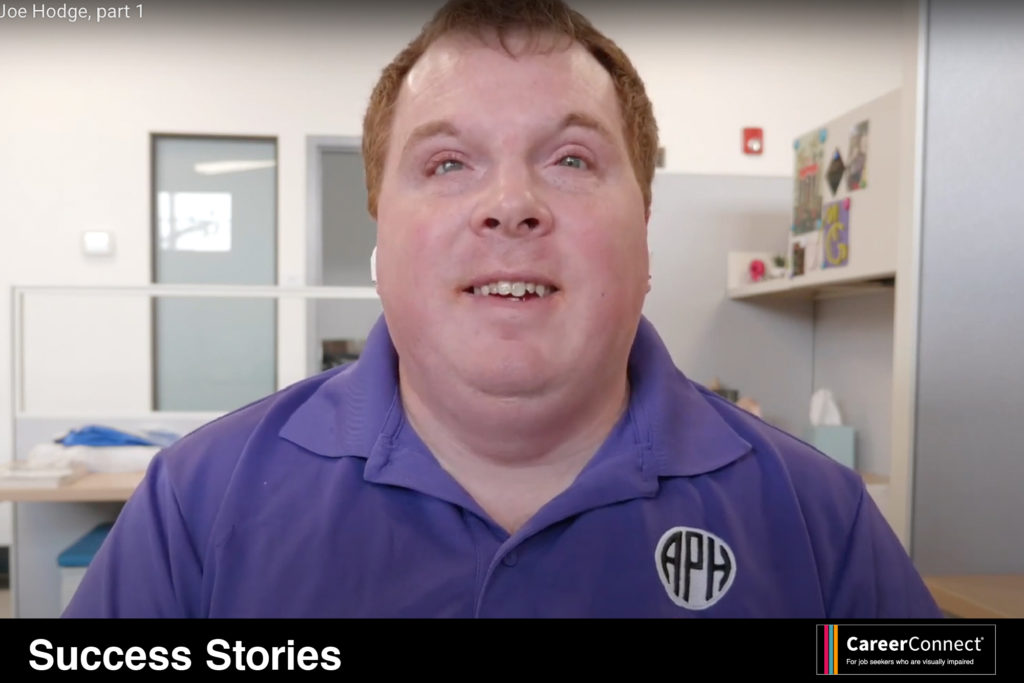Meet Joe Hodge: Software Quality Assurance Analyst with APH

In this 3-part Success video blog, Richard Rueda interviews Joe Hodge about his career as a Software Quality Assurance Analyst with APH and his upcoming career shift to Global Innovations. Joe shares his background and experiences working with and creating AT for blind users.
In this second installment of Success Stories video blog, catch up with APH Software Quality Assurance Analyst, Joe Hodge as he shares travel, job interview, and career-shift adventures and advice
In the final installment of Success Stories Video blog, APH Software Quality Assurance Analyst Joe Hodge shares how mentorship and life experiences have inspired him and shaped his career successes.
Interview with Joe Hodge, Software Quality Assurance Analyst
Question: What is your name?
Joseph “Joe” Hodge
Question: What is your job title, career field and employer name?
Quality Assurance, Technology, American Printing House for the Blind
Question: What does your organization do and what does your job entail?
Since 1858, The American Printing House for the Blind has operated in Louisville, Kentucky as the world’s largest nonprofit organization creating accessible learning experiences through educational, workplace, and independent living products and services for people who are blind or low vision.
There’s no other place like it. Creating things that make a real difference in people’s lives is what we do. For my job I test hardware and software looking for issues that will affect the customer’s experience with a product.
Question: Describe your blindness or vision?
I am totally blind. I had retinoblastoma which is a cancer of the retina. I have lost my sight around 1 year old, so I have no memories of vision.
Question: What kinds of job accommodations do you utilize?
Braille and speech are my main things that I need. I mainly use Jaws or NVDA with a 40 cell Braille display.
Question: What is your favorite part of your job?
Finding a bug that would have otherwise went out and made a customer’s life harder. When I was a kid I used to always get upset when my Braille-N-Speak would crash making me lose all of my school work. I think about that whenever I view a new product trying to look for serious bugs.
Question: What educational or vocational training prepared you for this work?
I graduated from Ball State University, and my time there really made me grow into who I am now. I grew up in the country where I just couldn’t have tons of independence, so going to college taught me a lot of O&M skills and life’s lessons.
Question: What types of blindness training did you have in your life (orientation & mobility, daily living skills, technology, Braille, etc.
Outside of my vision teacher in K-12 school, I didn’t have much. When I first went to Ball State, I had O&M set up by vocational rehabilitation services. Once I left there, I taught myself routes with GPS software.
Question: Did you have a job during high school? If so, what was the job(s)?
No, I tried but got rejected by a lot of things that were in my home area.
Question: What advice would you pass on to youth who want to work in a similar profession?
The biggest part of my day is thinking like a user. Don’t be afraid to try something new in this job, and if you brick a device then you’ve done your job. Insert laugh.
Question: Do you have any hobbies, sports, or other activities that you enjoy doing?
I like to go to different baseball stadiums and have been to 20 Major League Baseball ones. I also am really into audio and have several different headphones and speakers. I did get married recently, so I have cut back on those purchases a bit. Currently, I have around seven different headphones. Yes, only one pair of ears lol. My wife and I also like to travel. My goal is to go to Australia once it’s safe to do so.
Question: Do you have anything else you would like to share?
You’re going to hear no several times when applying, so get used to it. Remain strong and always build off of it and never stop learning. I heard this when getting my first guide dog, and I always try to remember it when dealing with the public. Most people have never met anyone blind or low vision, so even if I am having a rough day, I try to educate anyone I can and show them a positive attitude. Also network, the more people you know the more you may be able to find a job.